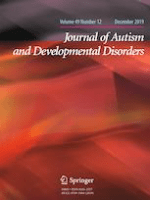
JOURNAL OF AUTISM AND DEVELOPMENTAL DISORDERS
Scope & Guideline
Transforming research into impactful interventions.
Introduction
Aims and Scopes
- Multidisciplinary Research on Autism:
The journal encompasses a wide range of studies from various disciplines including psychology, medicine, education, and social sciences, fostering a holistic understanding of autism spectrum disorders. - Focus on Intervention and Treatment:
There is a consistent emphasis on evaluating and developing interventions aimed at improving outcomes for individuals with autism, including behavioral therapies, educational strategies, and family support. - Cultural and Societal Perspectives:
The journal explores the impact of cultural, social, and economic factors on the diagnosis, treatment, and lived experiences of individuals with autism, contributing to a more nuanced understanding of autism across different populations. - Genetic and Neurobiological Research:
Research articles often delve into the genetic and neurobiological underpinnings of autism, aiming to elucidate the mechanisms behind the disorder and its associated developmental challenges. - Parent and Caregiver Perspectives:
The journal frequently includes studies that capture the experiences, challenges, and needs of parents and caregivers of autistic individuals, highlighting the importance of their voices in both research and practice. - Longitudinal and Developmental Studies:
A significant number of publications focus on longitudinal studies that track the development of autistic traits and associated behaviors over time, providing insights into early identification and intervention.
Trending and Emerging
- Telehealth and Remote Interventions:
The COVID-19 pandemic has accelerated the adoption and study of telehealth interventions for autism, with many articles focusing on the effectiveness of remote assessment and therapy options. - Intersectionality in Autism Research:
There is a growing trend towards examining the intersectionality of autism with factors such as race, gender, and socioeconomic status, highlighting the complexities of autism across diverse populations. - Neurodiversity and Self-Advocacy:
Research focusing on neurodiversity, self-advocacy, and the lived experiences of autistic individuals is increasing, emphasizing the importance of understanding autism from the perspectives of those who experience it. - Parent-Mediated Interventions:
A significant rise in studies exploring parent-mediated interventions reflects a shift towards empowering families to participate actively in the intervention process, enhancing outcomes for their children. - Focus on Mental Health comorbidities:
There is an emerging emphasis on the mental health challenges associated with autism, particularly anxiety and depression, and how these comorbidities affect overall well-being and functioning. - Use of Technology for Autism Interventions:
The integration of technology, including apps and virtual reality, into autism interventions is gaining momentum, with research exploring their efficacy in supporting social skills and communication.
Declining or Waning
- Traditional Behavioral Approaches:
There is a noticeable decrease in studies solely centered on traditional behavioral interventions like Applied Behavior Analysis (ABA), as newer methodologies and holistic approaches gain traction. - Single-Domain Studies:
Research focusing exclusively on a single aspect of autism, such as solely social skills or communication deficits, is becoming less common, with a shift toward more integrative studies that consider multiple domains. - General Population Studies:
Research examining autism in general population samples is waning, as the focus increasingly shifts to specific subgroups, such as those with co-occurring conditions or diverse backgrounds. - Focus on Adult Autism:
While there is still relevant research on adult autism, the volume of studies specifically addressing adult experiences and outcomes appears to be lessening compared to the growing emphasis on early intervention and childhood studies. - Narrow Diagnostic Criteria Studies:
Research examining the implications of narrow diagnostic criteria for autism diagnosis has decreased as the field increasingly embraces broader, more inclusive definitions of autism.
Similar Journals

CHILD PSYCHIATRY & HUMAN DEVELOPMENT
Transforming Understanding of Pediatric GrowthCHILD PSYCHIATRY & HUMAN DEVELOPMENT, published by Springer, stands at the forefront of research in the fields of developmental and educational psychology, pediatrics, perinatology, and child psychiatry. With an ISSN of 0009-398X and an E-ISSN of 1573-3327, this esteemed journal has been a vital resource for academics since its inception in 1970. Currently ranked in the Q1 category across its multiple relevant disciplines, it illustrates a significant impact with its Scopus rankings, placing it within the top 13% for pediatrics and child health and the top 18% for developmental psychology. Its comprehensive scope ensures that leading-edge studies, reviews, and discourse are accessible, contributing greatly to the understanding of mental health and developmental processes in children. With no open access option, the journal maintains a commitment to high-quality, peer-reviewed content that is invaluable for researchers, healthcare professionals, and students alike, as they strive to advance their knowledge and practices in child psychology and human development.
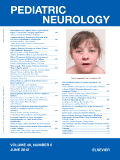
PEDIATRIC NEUROLOGY
Illuminating Pathways in Child Neurology ResearchPediatric Neurology, a prestigious journal published by Elsevier Science Inc, is a leading resource in the field of child neurology and developmental neurosciences. With an impressive impact factor and categorization in the Q1 and Q2 quartiles across several relevant fields, including Pediatrics, Neurology, and Developmental Neuroscience, this journal is essential for researchers and healthcare professionals focused on pediatric neurological disorders. Since its inception in 1985, it has provided a platform for high-quality research, clinical studies, and reviews that drive advancements in diagnosis, treatment, and understanding of neurological conditions in children. Although the journal does not currently offer open access, it maintains a robust reputation in the academic community, bolstered by its prominent ranking in Scopus metrics. By engaging with the latest findings published in Pediatric Neurology, readers will gain vital insights that contribute to improving pediatric healthcare outcomes in neurology and neuroscience.

COGNITIVE DEVELOPMENT
Shaping the Future of Cognitive ResearchCognitive Development is a prestigious academic journal published by Elsevier Science Inc, focusing on the critical area of developmental and cognitive psychology. With an ISSN of 0885-2014 and an E-ISSN of 1879-226X, this journal serves as a vital platform for the dissemination of innovative research, theories, and methodologies from 1986 to the present, with the latest articles contributing to a comprehensive understanding of cognitive processes in children and adolescents. Positioned in the second quartile (Q2) of both the Developmental and Educational Psychology and Experimental and Cognitive Psychology categories, Cognitive Development holds an essential place in shaping contemporary psychological research, boasting robust Scopus rankings of #175/360 and #90/165 in its respective fields. Though not an open-access journal, it provides valuable insights and rigorous studies essential for researchers, professionals, and students engaged in the intricate processes of cognitive development. Whether you're looking to publish significant findings or simply stay updated on the latest advancements, Cognitive Development is an indispensable resource in the psychological community.
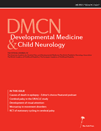
DEVELOPMENTAL MEDICINE AND CHILD NEUROLOGY
Exploring the intersection of development and neurology.DEVELOPMENTAL MEDICINE AND CHILD NEUROLOGY, published by WILEY, is a premier journal dedicated to advancing knowledge in the fields of developmental neuroscience, clinical neurology, and pediatrics. With an impressive impact factor, this journal is recognized for its contributions, achieving Q1 ranking in both Pediatrics, Perinatology and Child Health, and Neurology (Clinical) sectors, as well as Q2 in Developmental Neuroscience. Since its inception in 1958, the journal has been at the forefront of disseminating vital research that informs clinical practice and enhances child health outcomes. Researchers and practitioners benefit from its high-quality, peer-reviewed articles that address critical issues in child neurology, underpinned by a robust Scopus ranking and a formidable percentile standing in relevant categories. While currently not an open-access journal, it remains a key resource for those dedicated to the study of child development, particularly at its intersection with neurological health. With a commitment to excellence, DEVELOPMENTAL MEDICINE AND CHILD NEUROLOGY is an essential read for anyone engaged in the care and research of pediatric populations.
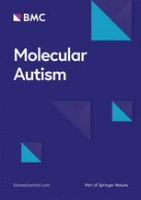
Molecular Autism
Pioneering insights into the molecular roots of autism.Molecular Autism, published by BMC in the United Kingdom, is a premier open-access journal dedicated to publishing high-quality research on the molecular and genetic factors contributing to autism spectrum disorders. Since its inception in 2010, the journal has established itself as a vital resource for researchers and clinicians, offering insights into the developmental biology, neuroscience, and psychiatric dimensions of autism. With an impressive impact factor and rankings placing it in the Q1 category across multiple relevant fields such as Developmental Biology, Developmental Neuroscience, Molecular Biology, and Psychiatry and Mental Health, it serves as a critical platform for the dissemination of innovative research and interdisciplinary collaboration. The journal encourages open dialogue through its commitment to making research freely accessible, thereby advancing knowledge and fostering advances in the understanding of autism. By bridging diverse disciplines and engaging with cutting-edge research, Molecular Autism aims to enhance our understanding of autism's complexities and inform future therapeutic approaches.

Journal of Behavioral Education
Shaping the Future of Behavioral EducationThe Journal of Behavioral Education, published by SPRINGER, is a prestigious academic journal that serves as a vital resource for researchers and practitioners in the fields of developmental and educational psychology. Established in 1991, this journal has consistently contributed to the understanding of behavioral education through innovative research, theories, and practices. With an impressive Q1 ranking in Education and a Q2 ranking in Developmental and Educational Psychology, it is recognized for its significant impact, achieving a percentile rank of 78th in Social Sciences (Education) and 67th in Psychology. While the journal does not currently offer open access options, it is committed to disseminating high-quality studies that advance educational practices and enhance learning outcomes. The Journal of Behavioral Education is an essential publication for anyone dedicated to advancing knowledge in educational psychology and behavioral interventions.
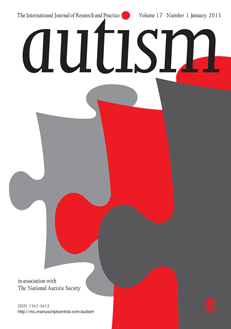
AUTISM
Advancing understanding of autism spectrum disorders.AUTISM, published by SAGE Publications Ltd, is a leading journal in the field of Developmental and Educational Psychology, recognized for its significant contributions to understanding autism spectrum disorders. With an impressive impact factor, AUTISM ranks in the top 94th percentile among developmental and educational psychology journals, placing it in the prestigious Q1 quartile as of 2023. Since its inception in 1997, this UK-based journal has served as a vital resource for researchers, practitioners, and students, providing a platform for high-quality empirical research, reviews, and theoretical discussions that address contemporary challenges and advancements in autism research and practice. Readers can expect to find innovative studies that influence policy, education, and treatment methodologies, making AUTISM indispensable for those dedicated to enhancing the lives of individuals on the spectrum.

Journal of Attention Disorders
Shaping the future of attention disorder treatment.The Journal of Attention Disorders is a premier peer-reviewed publication dedicated to advancing the understanding and treatment of attention-related disorders. Published by SAGE Publications Inc, this esteemed journal has become a vital resource in the fields of Clinical Psychology and Developmental and Educational Psychology, consistently ranking in the Q1 quartile for both categories as of 2023. With a significant impact factor and a commendable Scopus rank—#37 in Developmental and Educational Psychology and #34 in Clinical Psychology—this journal fosters innovative research and evidence-based practices that contribute to the mental health field. Since its inception in 1996, the Journal of Attention Disorders has provided a platform for the latest findings and discussions, supporting researchers, practitioners, and students alike. While the journal remains non-open access, it ensures rigorous dissemination of crucial information, solidifying its importance in shaping future research and best practices concerning attention disorders.

Analysis of Verbal Behavior
Bridging disciplines with innovative approaches to verbal behavior.Analysis of Verbal Behavior is a premier academic journal dedicated to advancing the understanding of verbal behavior and its applications within various disciplines, including psychology, linguistics, and education. Published by Springer, a prominent name in scholarly publishing, this journal serves as a vital resource for researchers, professionals, and students alike. With an ISSN of 0889-9401 and an E-ISSN of 2196-8926, it is accessible through traditional subscriptions, further enhancing its reach among the academic community. The journal is committed to disseminating high-quality research, including empirical studies, theoretical analyses, and practical applications, thereby contributing significantly to the field of behavior analysis. Scholars looking to stay current on the latest developments and methodologies in verbal behavior will find Analysis of Verbal Behavior essential for their professional and academic pursuits.
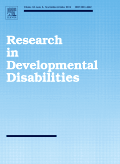
Research in Developmental Disabilities
Catalyzing research that shapes policies and practices.Research in Developmental Disabilities is a leading journal published by PERGAMON-ELSEVIER SCIENCE LTD, dedicated to advancing the field of developmental disabilities through rigorous research and evidence-based insights. Since its inception in 1987 and continuing through 2024, the journal has made significant contributions to the understanding of developmental and educational psychology, earning a commendable impact factor and ranking in the Q2 quartile in both Clinical Psychology and Developmental and Educational Psychology categories for 2023. The journal, with ISSN 0891-4222 and E-ISSN 1873-3379, features original research articles, reviews, and practical applications aimed at professionals, researchers, and students in the field, fostering a multidisciplinary dialogue around theories, interventions, and policies that shape the lives of individuals with developmental disabilities. While currently not an open access journal, it offers a crucial platform for disseminating knowledge and sparking innovative approaches to enhance educational and psychological outcomes for affected populations. With its roots in the United States and a global influence, Research in Developmental Disabilities is vital for those committed to understanding and improving the developmental trajectories of individuals facing these unique challenges.